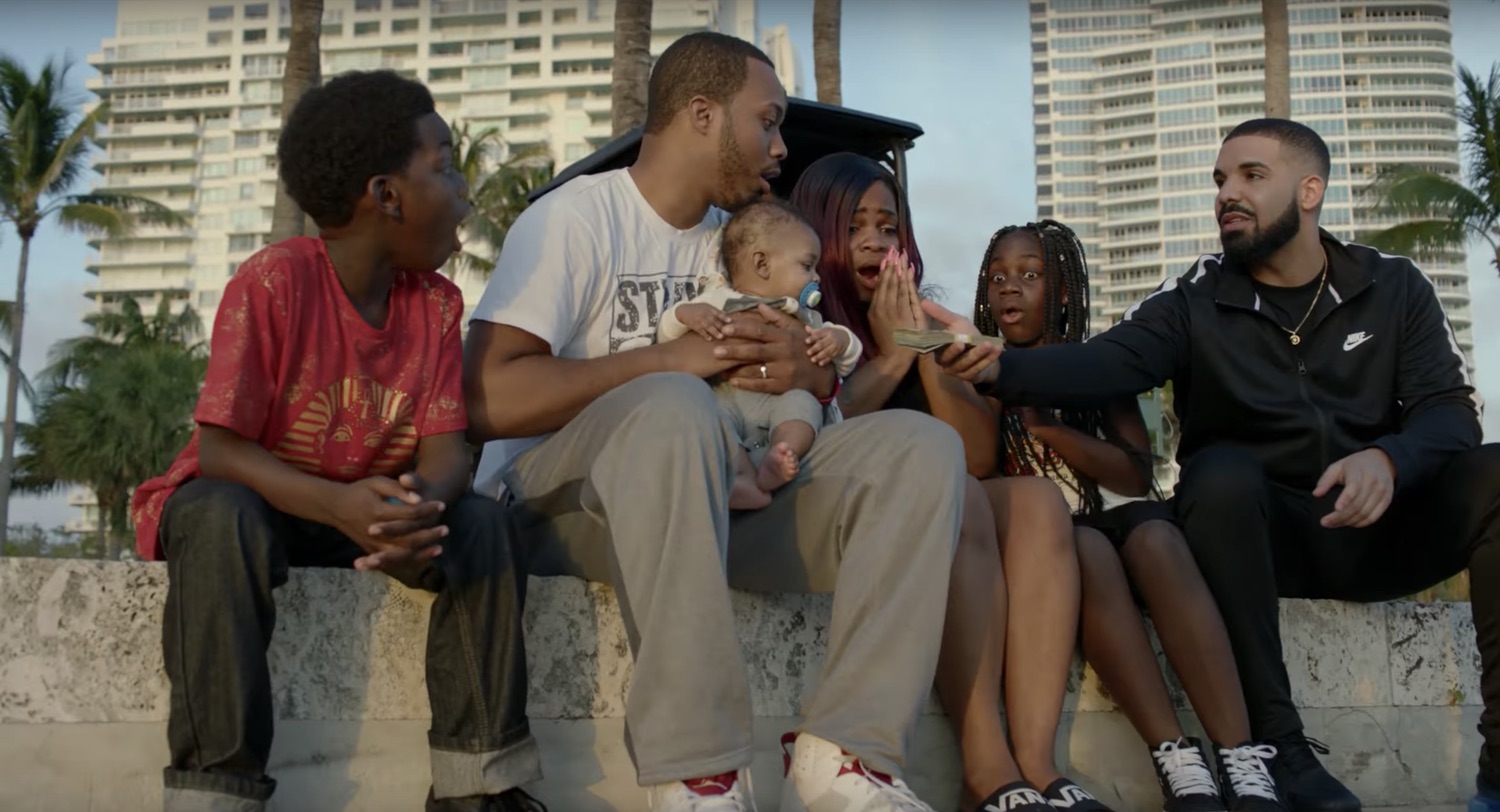Drake’s latest hit, “God’s Plan,” has been streamed more than 75 million times in the US. It has been number one on the Billboard Hot 100 for the fourth week in a row. And its astounding popularity is at least partially due to the song itself: like Drake’s bests, it is at once moody and danceable. He has had better lyrical nuances, but as usual, these are perfectly caption-able. He even ventures into new territory when, instead of relying on the soft emotionalism for which he is famous, he experiments with religion. No discernable gospel elements of the Chance the Rapper variety, and not even the beseeching catch-phrase of Kendrick Lamar’s DAMN. (“Pray for me”). Instead, he makes the matter-of-fact pronouncement that God is clearly on his side: “It’s a lot of bad things / That they wishin’ and wishin’ and wishin’ and wishin’/ They wishin’ on me,” he raps. But “someone watchin’ this shit close.” It’s all part of God’s plan.
On February 15th, he posted on Instagram about the music video: “The most important thing I have ever done in my career,” he captioned it. “Drop a 🙏🏽 if I can share it with you.” One day later, he shared the video on his Twitter, and the Internet cried. The video follows Drake as he gives away $996,631.90 – the entire budget of the video. He gives a scholarship to a student at the University of Miami, donates to a fire department, takes people on shopping sprees, donates to a women’s shelter, pays for everyone’s groceries, and gives to several other very commendable causes. Most evocatively, he literally hands stacks of cash to people in the street, choosing his beneficiaries, as far as we know, based on location and appearance.
Drake spends some screen time dancing in the “Hotline Bling” vein, but mostly, he doesn’t look at the camera. Instead, he smiles at those to whom he is handing the money or he laughs as he signs larger-than-life checks. Once, he hugs a crying boy and looks up at the sky, seemingly overcome with the intensity of his own righteousness. When one woman screams as he hands her cash, the volume of the song lowers for a moment so we can hear him tell her, “Yeah that’s right, you got the right idea.” When Drake is not on screen at all, we are shown some evocative images of poor people in Miami, to drive in just how good Drake is. And then there is the vague discomfort that arises when we pair the video with the lyrics: Is he thwarting God’s plan for these poor people out of the goodness of his heart? Is he God now – and is this his plan?
Some of the articles about the video have a sentence or paragraph in them that go through the motions of Jeremy Gordon: “The video feels annoyingly self-aggrandizing, yes…. Still, the fact remains: Here is a rich person giving away a rich label’s money to people who need it.” I will do the same, only in reverse: Of course it’s amazing that he is doing this charity. But I think there is something to criticize here that is worth dwelling on. Drake is, in the words of Raisa Bruner, “On a quest to be the most-loved rapper in the game.” Thus charity, at least in this music video, becomes not a variety of love but a variety of exhibitionism (he only loves his bed and his momma, he’s sorry).
Celebrities set the tone for the ways in which we think of service. They start foundations, champion causes, and use their names and faces to influence the public to look in a certain direction. Usually that is a specific direction, but the self-referential quality of this video by Drake is not towards one particular cause; instead, his money is aimed at anyone it would be reasonable to film receiving it, and so the focus is entirely on him. This is not just a question of values: charity is more effective when it is given intelligently and pointedly. Drake is doing a lot of good in his video, no doubt, but he could have done even more with that money. We should hold him to that high standard because of who he is and what he represents. Drake is so important and so popular, and therefore, he has so much potential to do good.
Drake’s claim to fame in the larger conversation about the direction of rap and hip-hop has been to make it “sensitive.” Charles Holmes wrote last year: “In less than a decade, the Degrassi alum transformed hip-hop and R&B into a Toronto-sized soap opera for worldwide consumption.” The point is, though, that Drake is used to making changes and shaping “the game” in his own image. So while charitable acts are not particularly common of pop and rap stars (with some notable exceptions), and definitely do not represent the hip-hop culture that surrounds these celebrities, Drake, to his credit, might be trying to flex that transformative muscle again and push the rap culture in the right direction. But if the point is direction, he should pursue a method of charity that continues giving. Start a foundation, donate a percentage of proceeds to a cause, have a tour in honor of a specific organization. Drake’s actions might point the hip-hop culture in a generous direction, I just hope he’s thinking about how he’s doing it.

Leave a Reply